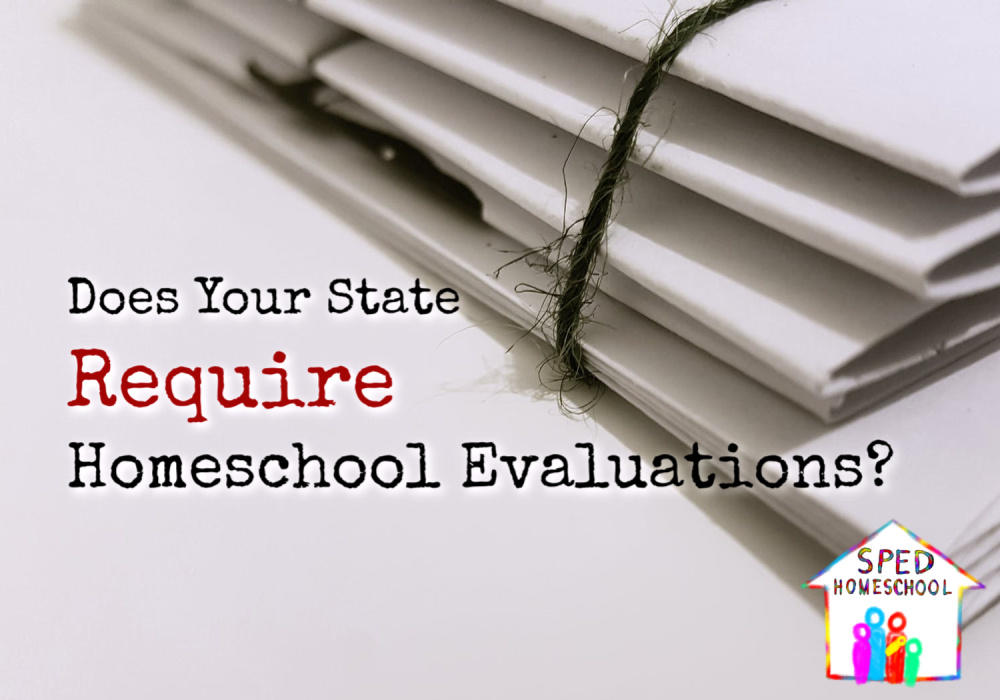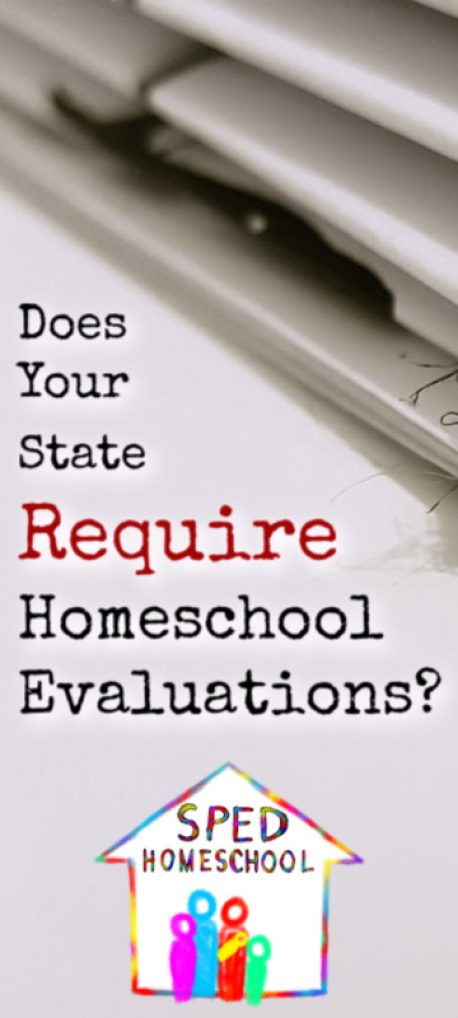
By Peggy Ployhar and Mary Winfield
One of the biggest stressors for new homeschoolers is trying to figure out what is required of them in their state. It can be overwhelming to dig through information to find what you need to do while being sure that you aren’t forgetting anything important. You also don’t want to have to hassle with testing if it isn’t required because often testing doesn’t accurately measure what your child knows due to anxiety, poor cross over skills, or other issues. Here is a comprehensive list of the bare minimum required for testing and evaluating in each state, so you can focus on what is most important: your child’s education. (States that have been omitted from the list do not have any evaluation requirements!)
“You also don’t want to have to hassle with testing if it isn’t required because often testing doesn’t accurately measure what your child knows due to anxiety, poor cross over skills, or other issues.“
Arkansas:
Norm-referenced testing is required for homeschooled students per state mandates for testing at students at specific grade/age levels . (Arkansas Department of Education, August 2007)
Colorado:
Standardized achievement tests must be given to homeschooled students in the 3rd, 5th, 7th, 9th, and 11th grades or the student should be evaluated by an individual deemed qualified. Norm-referenced testing marks must be above the 13% national mark or evaluations should show sufficient student progress. (Christian Home Educators of Colorado – Homeschool Law)
Connecticut:
Homeschool programs should be deemed equivalent to other schooling options available to that student and this equivalency is determined by an annual portfolio review of the school district. (The Education Association of Christian Homeschoolers Connecticut (TEACHCT) – The “Guidelines”)
Florida:
Homeschool families must be able to prove educational progress and back up that progress with a portfolio of the student’s work. (Florida Parent Educators Association (FPEA) – Florida Homeschool Requirements)
Georgia:
Homeschoolers are required to use standardized tests at a minimum every three years and yearly write an annual progress report. Records of both of these requirements are to be kept by the homeschooling family and are not required for reporting. (Georgia Home Education Association – Georgia Law)
Hawaii:
Annually families must file a progress report including standardized test results, a certified teacher evaluation of the student, or a parent-written student progress report with supporting work samples. Additionally, standardized tests are required for 3rd, 5th, 8th, and 10th grade students and can be taken through the local school or other evaluation alternatives may be requested by the parent in lieu of these tests. (Hawaii Homeschool Association – Hawaii Regulations)
Iowa:
There are some homeschooling options in Iowa that do not require annual reporting or assessment, but some options still do. To find out more about these options and the requirements each entail, visit the Homeschool Iowa – Know the Law and Rulespage on their website to find out more.
Louisiana:
Based on the homeschooling option you choose, testing and curriculum submission may or may not be required. To find out more visit the (Homeschool Louisiana – How Do I Start Homeschooling) website page.
Maryland:
Up to three times per year a homeschool can be assessed by the local superintendent (or designee). These assessments may include a portfolio review, discussion with the homeschooler regarding homeschooling instruction, and/or monitoring/observation of the homeschooled child. (Maryland Home Education Association – Legal)
Minnesota:
Homeschooled students are required yearly to take a standardized test that is nationally norm-referenced. Test results are not submitted for review, but there is a requirement that any student scoring below the 30% mark should receive additional testing for a specific learning issue. (Minnesota Association of Christian Home Educators (MACHE) – Legal)
New Hampshire:
An annual education evaluation for students can be determined either through an educational progress report written by a certified teacher, by a nationally norm-referenced test or local district assessment test, or another assessment tool “mutually agreed upon by the parent and the commissioner of education, resident district superintendent, or nonpublic school principal.” (New Hampshire Home Education Statutes Section 193:A6 Evaluation & Records)
New York:
New York regulations planning, reporting and assessments for all homeschooled students in the state. These requirements rage from mandatory oversight and content requirements of student Individualized Home Instruction Plans (IHIP), required course and instruction material submissions, attendance requirements, quarterly reports, and annual assessments. To understand the specifics of these area of regulation, visit the New York State Loving Education At Home (LEAH) – Regulations website page as well as the New York Home Instruction Regulations page.
North Carolina:
Homeschooled students are to take a nationally norm-referenced test on a yearly basis. (North Carolinian’s for Home Education (NCHE) – Helps Page)
North Dakota:
Homeschooled students in 4th, 6th, 8th and 10th grade are required to take a standard achievement test either administered in their local school district or that is nationally norm-referenced by an approved test administrator. Test results are to be filed with the local superintendent. If the student’s score is below the 30% mark, a team is assigned to evaluate the student for any disabilities. Upon completion of the evaluation, the parent, with advisement from an licensed teacher, is to create a remediation plan and file this plan with the district superintendent. If a remediation plan is not filed, the district can revoke the right to homeschool the student in question. (North Dakota Home Education Code)
Ohio:
Yearly assessments for the prior homeschooling year are to be filed at the beginning of each new homeschooling year. Assessments can be determined either via a norm-referenced test, a portfolio with written report, or by an alternative form of assessment. The validity of any of the above submissions must be determined by either a licensed/certified teacher, mutually agreed upon professional with the local superintendent or by a test administer approved by a specific test publisher. If the superintendent determines a student needs remediation based on their filed assessment, then the homeschooling parent must file quarterly progress reports for the subjects covered and explanations is less curriculum was covered than in the originally filed homeschool plan. If the student doesn’t show reasonable progress the superintendent has the right to notify parents the child must enroll the child. (Christian Home Educators of Ohio – Homeschool Regulations)
Oregon:
Norm-referenced tests are required for homeschooled students in 3rd, 5th, 8th, and 10th grade and some districts request for those tests to be filed. Students with learning difficulties can request other forms of evaluation if desired. For students who fall below the 15% mark there is an allowance given to help the student improve over a three-year period. (Oregon Christian Home Education Association Network (OCEAN) – Summary of Homeschool Law)
Pennsylvania:
Evaluation of a yearly portfolio with the addition of nationally norm-referenced tests or state administered tests for reading/language and mathematics in 3rd, 5th, and 8th grade is required as well as a report which includes documentation of an interview with your student and an assessment of the student’s portfolio contents. (Pennsylvania Homeschoolers Accreditation Agency – Law Guide)
South Carolina:
Homeschoolers have three options in South Carolina which vary testing and evaluation requirements. Under option one parents must keep a plan book, portfolio, semi-annual progress report and yearly testing results from their student’s participation in the Basic Skills Assessment Program. Options two and three vary in their requirements per specifics are determined by your choice of oversight agency. For more information on these options and the laws associated with them visit the South Carolina Education Association Homeschooling website page.
South Dakota:
Homeschoolers are required to use test using a standardized test monitored by their local school, a norm-referenced test covering math and reading provided by the Department of Education, or a nationally standardized test of basic skills in the 4th, 8th, and 11th grades. Test results are to be filed with the local school district. (South Dakota Education Association – Homeschooling)
Tennessee:
There are two homeschooling options in Tennessee. Under one option homeschooled students are to be tested in 5th, 7th, and 9th grade, while under the other option the oversight institution determines the homeschool students testing requirements. (Middle Tennessee Home Education Association – Is It Legal)
Vermont:
Annual assessment is required by one or more of the following methods: a formal report submitted by a teacher licensed in Vermont; a student portfolio that demonstrates progress and is accompanied by a report from either a parent, teacher, or curriculum publisher; and/or standardized testing results from an approved achievement test covering agreed upon subjects and scored per publishers standards. (Vermont State Board of Education Home Study Program Statutes)
Virginia:
Homeschooled students not taught by a certified teacher must submit a yearly report that includes either testing results from a nationally norm-referenced test, an equivalence score from the ACT, SAT, or PSAT, an evaluation letter from a licenced teacher or other approved academic professional, or a report card from a “community college or college, college distance-learning program, or home education correspondence school.” (Home Educator’s Association of Virginia (HEAV) – Virginia Homeschool Laws)
Washington:
Annual testing is required and can be obtained either through a non-test assessment by a teacher certified by the state of Washington or through a standardized test approved the the Washington State Board of Education. There is no requirement for filing testing results. (Washington Homeschool Organization – The Law)
West Virginia:
Yearly assessments are required via either a nationally normed standardized test, a testing program used in a state school in the student’s county of residence, via a portfolio reviewed by a certified teacher with a written report, or through an alternative assessment “mutually agreed upon by the parent or legal guardian and the county superintendent.” If assessments fail to show “acceptable” progress, a remedial program should be initiated by the homeschooling parent/guardian and if progress does not improve in the following year’s assessment their must be additional materials presented to the superintendent showing additional instruction remediation.(Christian Home Educators of West Virginia – WV Homeschool Law)
Hopefully you were able to find some clarity and peace as to what you will need to do to ensure a successful homeschool year in the eyes of your state from this list. Do you want to connect with other homeschoolers and maybe find some people in your state? Head over to your Facebook support group; we would love to have you!
The data shared in this article is for informational use only. In no way is the contents of this article intended to constitute legal advice.
Also we are aware that homeschool/educational law in every state is constantly changing. The information shared in this article was compiled in March 2019. There is no guarantee the data above is currently correct, complete, or up-to-date.
Please refer to the links provided in each section for further investigation into each particular state law referenced.

